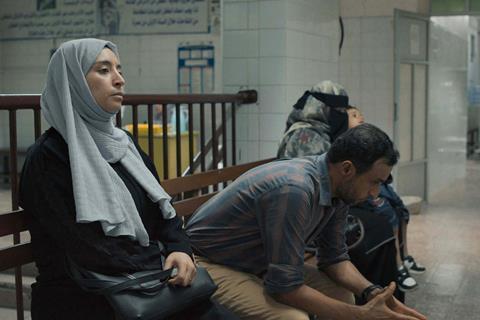
Of the three films Yemen has submitted to the Academy Awards’ international feature film category to date, two have been directed by theatre director-turned-filmmaker Amr Gamal. The first was his 2018 film 10 Days Before The Wedding, and now his follow-up The Burdened has been entered into the Oscar race.
Inspired by true events experienced by close friends of Gamal, The Burdened (Al Murhaqoon in Arabic) tells the story of a Yemeni family pushed to the brink by the country’s economic crisis and left to ponder the unthinkable: to abort their fourth child, avoiding another mouth to feed during such uncertain times. In Islam, abortions are ‘haram’ (forbidden) yet there is a passage in the Quran that could allow the procedure if performed before a certain date. While Islam’s holy book could be seen to support their decision, final judgment is up to local medical authorities and the opinion of the family’s acquaintances.
It is a tough subject matter, and the film’s making was equally as challenging. Yemen not only lacks the infrastructure necessary to film world-class cinema, but is also in the midst of an ongoing civil war as well as rising poverty levels.
“Everyone is busy with politics here, so they feel like, ‘Let’s not pressure the younger generations with asking for too many permits,’” Gamal says about Aden, the picturesque southern city he calls home and where the story of The Burdened is set. With no organised film board covering the south of Yemen, Gamal — who has a respected track record with 10 Days Before The Wedding and theatre work — was not required to submit a screenplay for pre-approval before shooting. It is a different story in the northern Sanaa region, Gamal says. “The local governorate is under Houthi control, and you cannot shoot a single shot without going through them.”
Despite such limitations, Gamal describes the opportunity to break new ground in Yemeni filmmaking as “a delicious challenge”. For The Burdened, he was able to secure some post-production funding from Saudi Arabia’s Red Sea Fund, and has Sudanese award-winning filmmaker Amjad Abu Alala and Mohammed Alomd’a serving as co-producers. Gamal also managed to assemble a multinational crew, including an Indian cinematographer, an Egyptian editor, a Taiwanese composer, a Lebanese sound designer, a UK sound mixer and a colourist from the Czech Republic.
Yet securing the equipment necessary to shoot the film is something that Mohsen Alkhalifi, Gamal’s producing partner at Adenium Productions and a Yemeni-American TV presenter, jokingly calls “mission impossible”.
Making a movie that met “all the requirements for screening in international theatres and platforms was challenging,” Alkhalifi admits, not least because Yemeni production companies tend to focus on TV news and YouTube videos. “The sad truth is that all the companies we have in the country had never done a feature film for cinema.”
The production, however, found a way to circumnavigate this. “We made deals with the leadership of the local TV channel in Aden and convinced them to buy a camera, as a kind of sponsorship,” continues Alkhalifi, who credits Gamal’s “great name and history” in Aden with securing this essential piece of equipment.
Logistics proved an extra challenge. “That was another mission impossible, actually getting the camera into the city,” explains Alkhalifi. “It came from the UAE and moving it to Yemen, with all the checkpoints and various regulations by many different local authorities, was also a hassle and required many permits.”
Without a proper film board, submitting the film to the 96th Academy Awards also proved difficult, even though Yemen was ready to back the project after the film’s world premiere in the Berlinale’s Panorama section, where it became the first Yemeni film to play the festival and won the Amnesty International prize. The Burdened — with international sales handled by Films Boutique — has gone on to win several further awards, including most recently the Gold Hugo as part of the new-directors competition at Chicago International Film Festival.
Yet Ampas’s board proved less lenient than in previous years. “They were very strict and wanted us to do things the right way so we went through the long process of asking the Ministry of Culture to put together a committee and showed them the film to approve it,” Gamal says. What the director calls “tiny, tiny details” made the difference, including the rule about screening the film for seven days in front of an audience — which Gamal and Alkhalifi secured in Taiwan.
“It’s a great learning process,” Gamal concludes. “We will know what to do next time.”






![The Brightest SunScreen[Courtesy HKIFF]](https://d1nslcd7m2225b.cloudfront.net/Pictures/274x183/3/5/0/1448350_thebrightestsunscreencourtesyhkiff_312678.jpg)


















No comments yet